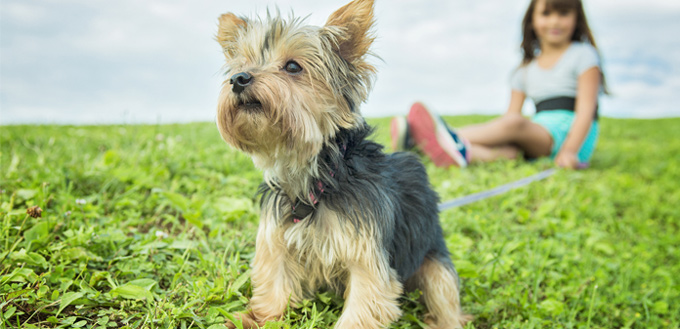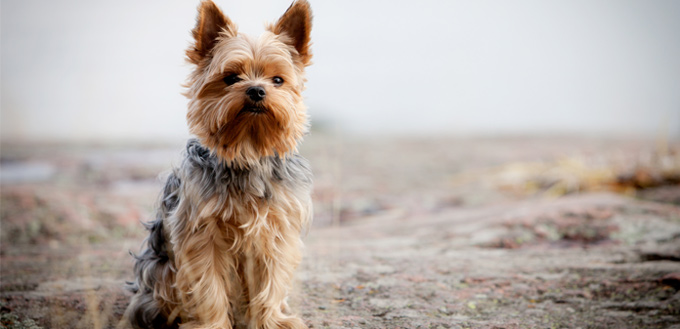Bold and confident, the Yorkshire terrier is one of the most popular dog breeds highly valued for its independent nature in a small package. There are two types of Yorkies, as these dogs are commonly referred to, and this has nothing to do with a subset of the breed, but more about the type of pet parents who may have very different views about this loveable pet. On one side of the fence are pet parents who consider Yorkies to be very vigorous terriers owing to their natural gameness and energy levels. On the other side of the fence are those who look at the Yorkie as a toy dog that needs to be pampered. It is these two conflicting views of the Yorkshire terrier that will shape the dog’s character.

Quick Facts
- Yorkshire terriers were very popular lapdogs of high society ladies as well as high-ranking political figures, with one particular dog having lived in the White House together with the Nixons. Today, almost every other dog lover has a Yorkie.
- The dog is a blend of the now-extinct Clydesdale terrier and an endangered Skye terrier, both from Scotland. The Clydesdale is known for its show dog qualities while the Skye is revered for its fox- and otter- hunting abilities.
- Yorkies were formerly known as broken-haired Scotch terriers as well as toy terriers.
- They originated in Scotland, brought to Yorkshire, England by Scottish weavers as important rodent exterminators for woolen mills of the English countryside.
- The Yorkie has above-average intelligence and can be easily trained, especially if you’re using the right training methods.
- Yorkies are very energetic dogs, requiring ample playtime and/or exercise.
- Yorkshire terriers are toy dogs but with the personality of a pure-bred terrier.
- They are highly alert and have an insatiable curiosity, giving it the moniker ‘big little dog’.
- It is known for its bravery, courage, and determination, something that many cannot fathom because of its size.
- It has a very tough-minded personality and can be nippy especially with overzealous kids, making them not a great choice as pets for households with young children.
- They can be quite antagonistic to other dogs and will never back down from a challenge.
- These dogs require highly-structured and consistent training.
- Yorkies love action, speed, and an overflowing of applause from those who see them.
- Show-quality Yorkies weigh anywhere between 4 and 7 pounds. Non-show dog pets, however can grow as heavy as 15 pounds, although 12 pounds is the lower limit.
- While Yorkies may be small, they are prone to serious health problems such as collapsed tracheas, liver problems, luxating patellas, dental problems, hypoglycemia, and many more.
- They need regular and frequent brushing, weekly baths, frequent brushing of the teeth, regular trips to the dog groomer and proper nutrition.
Related Posts: Best Dog Food for Yorkies and Best Dog Brush for Shedding
Temperament
The Yorkshire is your stereotypical little bundle of joy. Its energy can only be matched by its enthusiasm for life. It is highly independent and very smart, too making it such a joy to train. Unfortunately, in the hands of a pet parent who pampers it too much, it can get pretty stubborn. Some experts believe the Yorkshire terrier is a cat in a dog’s body, intelligent yet with an unquenchable thirst for independence. If you don’t train it early on, especially in the first 3 months of its young puppy life, you’ll find just how stubborn this little pooch can be. To give you an idea, even larger hulking dogs bow down to the indomitable spirit of this feisty hound.
Yorkies are very curious. Yes, they love nothing more than to please their human masters. But if something more interesting catches their attention, no amount of restraining will ever prevent these dogs from checking this new thing out.
Depending on how you raised them, Yorkies can be divided into two very distinct personalities. One is mischievous while the other is the adorable and cuddly hound everyone associates with the breed. Males are generally sweeter, if you tend to believe pet parents who have owned these canines. Male Yorkies love to snuggle up to you. Females can be a bit more catty, to say the least.
While they may be small, Yorkies have a very fearsome reputation. Being true terriers, they will not hesitate to face danger head-on. There are several stories about Yorkies doing incredible feats of courage and bravery. In World War II, Smokey pulled through an underground tunnel more than 70 feet of wire. In New York, Oliver saved a woman from getting attacked by another dog by drawing the other’s attention. As a matter of fact, Yorkies will never back down from a fight even against dogs that are 3 times the Yorkie’s size.
These dogs perform exceptionally well in agility trials as well as in performing a variety of tricks. They love the attention, after all. Showering them with nutritious and delicious treats as well as positive praises is the key to developing the full potential of this man’s best friend. Unfortunately, because of their adorable looks, it is easy for pet parents to spoil them.
You May Also Like: Dog Treats

Things You Should Know
While the Yorkie is as adorable as any other toy dog and very confident and agile as any other terrier, they are not immune to diseases and other health conditions. In fact, Yorkshire terriers are especially prone to the following:
- Collapsed or weakened trachea
- Dental problems such as improper teeth development and overcrowding
- Legg-Calve-Perthes disease, a disorder whereby there is a degradation of the head of the femur of the hind legs secondary to inadequate blood supply.
- Hypothyroidism
- Luxating patellas
- Low blood sugar
- Bladder stones
- Ingrown eyelashes
- Cataracts
- Hair loss
- Portosystemic shunting, a liver defect which requires very expensive surgery
Aside from these health issues, Yorkshire terriers also require meticulous grooming if you really want to retain their show dog-quality coat. They will need regular daily brushing. Their topknots should be tied up properly. Weekly baths are a must and so are frequent trips to your favorite local dog groomer.
The good news about Yorkies is that they don’t shed as heavily as other breeds. They do have pet dander, but is almost negligible that they’re considered to be safe even for individuals who have known pet dander allergies. Keep in mind though that the Yorkie’s allergenic potential is actually dependent on how well its human master cares for it.
History
Most people know that the Yorkie has its origins in Yorkshire in England. However, the breed is actually a mix of two different breeds originating from Scotland – the Clydesdale and the Skye terriers. The Clydesdale terrier is now extinct and was also known as the Paisley terrier. They were primarily bred as show dogs, having silky silvery blue and tan soft jacket that flows elegantly to the ground. It’s characterized by profuse ear feathering. On the other hand, the Skye terrier is a plucky little hunter highly valued for their hunting instincts going after otters and foxes. The Skye lives to this very day, but is now listed as an endangered breed. It is the combination of the Clydesdale’s show-dog characteristics and the Skye’s natural hunting abilities that are now the epitome of a true Yorkshire terrier.
The very first Yorkies served as ratters. Weavers, business owners, and miners in Scotland used Yorkies to help keep their workspaces and other valuable spaces virtually rodent-free. And it is easy to see why Yorkies are perfect for the job. Their diminutive size can easily fit into the smallest of spaces while the Skye terrier in them gave them the tenacity to go after their prey, only this time it’s rats and other rodents and not foxes and otters.
In the middle of the 1800s, Scottish weavers migrated down south, bringing with them their invaluable small dogs. These dogs proved to be excellent ratters especially in the woolen mills of the English countryside. Over the years more and more dogs were turned into companion dogs. This prompted local breeders to go for smaller size. In 1865, the progenitor of the modern Yorkshire terrier, Huddersfield Ben, was born.
The Yorkie wasn’t called as such yet at the time. Instead it was known as toy terriers or broken-haired Scotch terrier. Angus Sutherland, a reporter, initiated a movement that would name the dog after the region where it was bred. In 1870, the toy terrier was officially recognized as the Yorkshire terrier. Not long after the Yorkie began appearing in dog shows and became the indomitable sidekicks of many of England’s social elite.
By 1872, these adorable dogs had already reached the shores of the United States, quickly becoming the favorite of many of the growing nation’s emerging elite. These dogs also served as political mascots with none other than former US president Richard Nixon having a Yorkie named Pasha sharing the White House with the First Family.
The Yorkshire terrier is the American Kennel Club’s number 3 top dog.
The Yorkie may be small but its personality is that of a large dog. Its growth depends on how you view it, whether it is a true terrier or a toy dog or even a combination of both.
Sources:
- Yorkshire Terrier, The American Kennel Club
- Yorkshire Terrier National Rescue Inc, GuideStar are Candid





